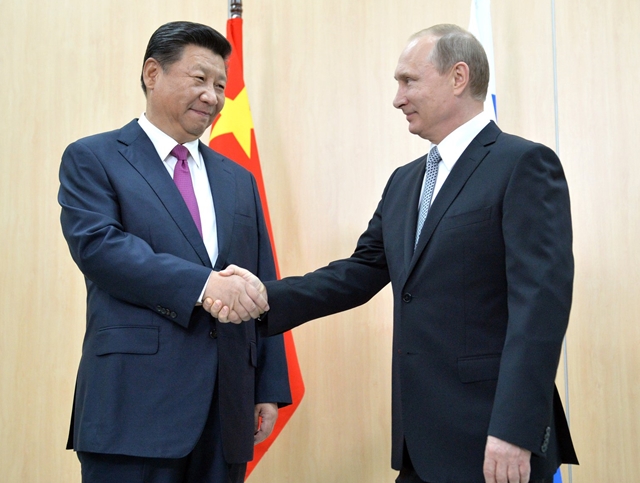“This is worse than a crime,” Talleyrand famously said of Napoleon’s execution of the Duke of Enghien: “it is a mistake.” The same can be said of Russian President Vladimir Putin’s “special military operation” in Ukraine, almost four weeks after it was launched.
However the battle turns out–even if the Russian army achieves its operational objectives in the end–the strategic outcome is likely to be a weakened Russia with a less secure Putin at its helm. This outcome is not a matter of temporary military-political conjunction. Quite apart from the complex origins of the conflict, a compromised Russia seems inevitable in two significant respects.
The most important negative consequence for Russia in the long term–not just geostrategically but also culturally and psychologically–is that Putin’s action will have contributed to the previously divided Ukrainian nation’s coming of age. Let us recall that Ukraine freely elected a pro-Russian national assembly majority in 2012 and a pro-Russian president, Viktor Yanukovych, in a hotly contested election two years earlier. Now such political feats cannot be repeated, except perhaps at a regional level in the southern and eastern parts of the country. The events which have unfurled since Feb. 24 are likely to change Ukraine’s cultural and political map for many years to come.
The Western media tend to present Ukraine as a monolithic entity, a regular nation-state, like Poland or Romania. Even after the U.S./EU-instigated Maidan coup in 2014, however, the country’s linguistic, cultural, and political divide has remained significant, with millions of Russian speakers feeling marginalized. It is nevertheless noteworthy that by and large, they have not greeted the Russian Army as liberators. The defenders entrenched in Ukraine’s major cities are not solely Azov-style neo-Nazis using civilians as human shields. Those eminently nasty characters are present in the field, of course, and in Mariupol they have done their worst, but clearly their numbers are not sufficient to maintain resistance at its present level. The rank-and-file “soft-Ukrainian” veterans and their families, once the fighting is over, are likely to see themselves as distinct from Russians–possibly hostile to them–even in those areas where the Russophobic variety of western Ukrainian hard nationalism had not been present in the past.
This Ukrainian dissociation from Russia is likely to be the most significant legacy of Putin’s operation, regardless of the political settlement which will end the conflict. And sooner or later there will be a settlement.
But there is an alternative scenario to consider as well.
Chechens are definitely an ethnos, and Muslims to boot. They were beaten in the 1990s, pounded far worse than Ukraine today, but that did not permanently alienate them from Russia. In Ukraine, in fact, they are performing quite enthusiastically as Russian auxiliaries. Other analogies might be the Scottish Highlanders and the American South: both were defeated, harshly. Both maintained a sense of identity but fell into line with the respective victors. This type of scenario seems less likely than a resentful Ukraine lastingly detached from Russia, but it should not be discarded as a priori implausible, especially considering that the bloom may be off the rose of the West, which didn’t do diddly-squat for Ukraine, leaving the possibility of a strong sense of betrayal; the future will tell.
Either way, Ukraine has been used with uttermost cynicism as a pawn of the neoliberal-neoconservative duopoly in Washington and its Euro-minions, none of whom gives a hoot for its people, or for any other peoples. So far, the ploy has worked to the detriment of both warring parties. Nevertheless, the fact remains that Putin started the war, and he bears the primary responsibility for how it is being pursued. Why he did so is another matter.
The claim that Putin has been pushed into this war is not without merit, but it is the job of a statesman of stature not to be pushed into risky moves. Otto von Bismarck made the push against Napoleon III to great effect with the Ems Dispatch in July 1870. FDR performed a similar feat on a grand scale against the Japanese in the fall of 1941. By not finding creative hybrid warfare alternatives to a massive and possibly self-defeating military operation, Putin has failed both as a strategist and as the leader of a great nation.
The second aspect in which Russia likely will be weakened by Putin’s action is in its global position as an autonomous great-power actor, actively loathed by the political West, to be sure, but respected–and feared–by friend and foe alike. From now on, sanctioned and crudely maligned by the collective West, and likely damaged by losing Ukraine in the cultural sense (regardless of the political arrangement to end the war), the Bear will be pushed into an ever tighter embrace of the mighty Dragon in the East. No longer an equal partner but effectively a supplicant, he will be treated with smiling aloofness, which the Middle Kingdom has already displayed at the UN Security Council by abstaining from the vote condemning Russia. If Putin had expected that China would be his reliable ally in the Ukrainian endeavor following their mutual expressions of boundless friendship, his miscalculation will come to haunt him for years.
The political West, led by the U.S., may yet fatally damage itself by its mendacious and ultimately hysterical treatment of Russia, but that in itself will not be enough to save Russia from its likely coming decline. With Europe beyond salvation demographically and spiritually, and the globalist cabal in Washington on a self-destructive rampage, Comrade Xi has every reason to be delighted by what looks like a solid mandate from Heaven.
